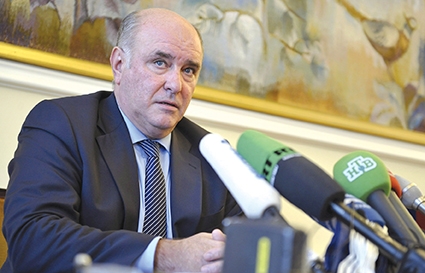Russia’s Karasin Calls on Georgia to Fulfill Terms of Cargo Monitoring Agreement
Russian Deputy Foreign Minister Grigory Karasin has called on the Georgian side to fulfill the terms of the mutual Cargo Monitoring Agreement, “instead of demanding only that Russia follow the agreement”.
The statement was made by Russian Deputy Foreign Minister in his interview with Russian news agency Ria Novosti.
“We call on Tbilisi to express readiness to honestly meet its international commitments," Karasin said.
The official explained that the document mandates Russia and Georgia, with the participation of a Swiss company, to use special customs administration rules for trade flows. According to him, Georgia is not following the terms of the agreement and expresses high demands of Russia.
Georgian Foreign Minister Mikheil Janelidze has responded to Karasin’s statement, saying Georgia was ready from the beginning to fulfill the commitments imposed by the agreement.
“We expect the Russian Federation to make the relevant steps to fully meet the Cargo Monitoring Agreement… We are also ready to sign a contract with a mediator company to implement the agreement. We expect the basic agreement and relevant contract to be fulfilled by all parties. It is impossible to fulfill them unilaterally,” he stated.
State Minister for European and Euro-Atlantic Integration of Georgia, Victor Dolidze, said that since the agreement was signed, Georgia's commitment and responsibility towards the issue has not changed.
“We have no problem about the issue and are ready to start this process. The statement of Karasin is unclear,” Dolidze stated.
The Georgian Minister for Reconciliation and Civil Equality, Ketevan Tsikhelashvili, also noted that the Georgian side has fulfilled all its obligations, and added that “now it is Russia’s turn to make steps towards the implementation of the agreement”.
Georgia and Russia signed the agreement on Cargo Monitoring on November 9, 2011, in Geneva, with the participation of Switzerland.
At the meeting, Georgia and Russia agreed to involve a neutral company to monitor the movement of goods. The Swiss Confederation was tasked with selecting a neutral private company in consultation with Georgia and the Russian Federation.
The sides agreed to create a mechanism of customs administration and monitoring of trade in goods. The mechanism’s functions included gathering and sharing information, ensuring transparency, data transfer, crime and smuggling prevention, and examining suspicious cargo.
Georgia and Russia decided that the mechanism would entail both an Electronic Data Exchange System (EDES) and International Monitoring System (IMS).
Thea Morris












